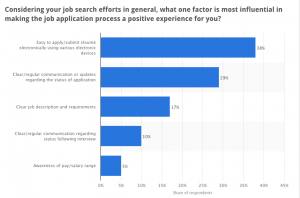Recruiting new employees is hard work, costly and time consuming. In fact, the average American company spends $4,000 to fill an open position, per Bersin by Deloitte. What can a business do to make hiring easier? One improvement may be to communicate better, particularly in the interview process. Consider these ideas for how to be a good interviewer.
It takes an average of 52 days to fill an open position, up from 48 days in 2011 — Bersin by Deloitte.
1. Prepare for each candidate
Review the resume, cover letter and other application materials. Scan the applicant’s social media channels to get a different perspective. Being prepared helps interviewers feel more confident. The more confident you are, the better the interview experience will be for both parties. When you’re relaxed it is easier to make the other person feel comfortable.
2. Set the candidate up for success
Start by preparing candidates with the information they need to know about the interview process. Who will be involved in the process? Where will it take place? When, and for how long? Trying to trick or surprise the applicant has two big drawbacks:
1. An uncertain candidate is a less confident one, which can inhibit the person’s ability to communicate their strengths, qualities or why they are the perfect fit.
2. An unprepared candidate may wonder about the support systems in place for employees at your organization. You could decide a candidate is your first choice only to find out they are reluctant to work for someone that deals in surprises.

Source: Kelly Services
3. Have good questions ready
Don’t just wing it. Don’t expect every candidate to reveal something true and honest about themselves in response to the exact same question — the right line of questioning will depend on each applicant.
Some top interview prompts from recruiters include:
Tell me about the biggest mistake you ever made at work and what did you do about it?
How do you evaluate success?
What were some of the first impressions you got from walking into and waiting for a few minutes in our (organization/newsroom/business)?
Tell us something about our company; how it is better than your present working company?
If I were to talk to one of your previous supervisors, what might they recommend as an area of improvement for you?
4. Listen actively
There is a difference between hearing and actively listening — any parent sees the distinction daily when a child hears the request to turn off the electronic, but does not actually listen to the meaning of the words. Interviewers can struggle with active listening because they are busy trying to evaluate a candidate’s responses and deciding what to ask next. Slow down. Don’t anticipate. Actively listening to the candidate’s words as well as their tone. Paying attention to the nuance of an answer can lead to a deeper follow-up question than simply following a mental checklist.
On average, each corporate job opening attracts 250 resumes. Of these candidates, four to six will be called for an interview and only one will be offered the job. — ERE Survey
5. Be comfortable with silence
The pause is a powerful tool for an interviewer. Humans — especially nervous ones — struggle with silence. Ask a question, then wait for an answer. Actually wait. Even count to five in your head before jumping in to fill in that dead air.
Interviewers who wait patiently for a few seconds before responding to an answer or asking their next question might see the candidate expanding on the reply. This added information is often illuminating as it might be something the applicant was planning in advance to say.
In the event of a phone interview, all of the above still apply. Yet, with VoIP phone services, the interviewer can easily record the call (with the applicant’s approval) to share with others involved in the hiring process.
A good interview is more conversation and less interrogation. Prepare yourself and the job applicants for a positive interview experience — it can pay off for both of you.
Other Related Articles:
3 Small Business Challenges
Advantages of VoIP for Small Business
Why is Customer Service Important to Business?

